|
|
|
Sort Order |
|
|
|
Items / Page
|
|
|
|
|
|
|
| Srl | Item |
| 1 |
ID:
171152
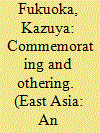

|
|
|
|
|
| Summary/Abstract |
The Yasukuni Shrine in Tokyo, once the symbolic center of national commemoration of war dead in pre-War years, is now regarded as one of the critical conservative symbols of Japan’s imperial past. While the Yasukuni study is expanding, not much has been explored on the nature of public reactions to the controversy. This study explores Prime Minister Abe Shinzo’s Yasukuni pilgrimage in 2013 and delves into Japanese public opinion on and around it. Overall, the Japanese public is relatively composed and prefers cautious approach; yet, at the same time, more people now support the official Yasukuni visits in general. This study also reveals discernible, yet nuanced, disagreements among PM Abe’s Yasukuni policies, the public perceptions of them, and the narratives of major newspaper editorials on this issue. The coverage of public opinion polls by the major national newspapers uncovers the public opinion on (1) the official Yasukuni visit, (2) the idea of building an alternative non-religious national memorial, and (3) the Japanese public’s decreasing sense of affinity toward China and South Korea (and their implications on understanding the Yasukuni issue and the sense of nation). The study will also examine the newspaper narratives on the controversy, which should help exemplify the overall public mood over the years.
|
|
|
|
|
|
|
|
|
|
|
|
|
|
|
|
| 2 |
ID:
172181
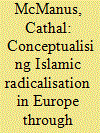

|
|
|
|
|
| Summary/Abstract |
Recent terror attacks across Europe have raised concerns about the issue of “radicalisation” amongst sections of the Islamic populations and how it might be successfully prevented. Drawing on the growing literature analysing “radicalisation” and applying the experiences of Northern Ireland over the past half-century, this paper argues that there is a need to move away from current discourses around radicalism and to explain the extremism that manifests itself in violent actions within the parameters of sectarianism. Arguing that this sectarianism is grounded in long-term processes of “Othering,” the paper will contend that there is a need for Western governments to recognise and address long-held grievances and fears within the Islamic community in order to reduce the threat of violence.
|
|
|
|
|
|
|
|
|
|
|
|
|
|
|
|
| 3 |
ID:
112409
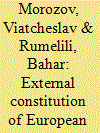

|
|
|
|
|
| Publication |
2012.
|
| Summary/Abstract |
The view of identities as always situated in a relationship with the Other underlies contemporary constructivist social theory. Taking a step further, and combining constructivist approaches to identity with insights from post-colonial studies, this article argues that the Other, far from being a mere presence, often plays an active role in identity politics. By tracing the historically varying ways in which Turkey and Russia have engaged in European identity construction, it demonstrates that this is an interactive process of negotiation between the European Self and its external Others in which agency of the Other is revealed. In particular, Russia and Turkey exercise agency by challenging, each in its own manner, the EU's power to define the normative meaning of Europe. While Turkey has contributed to a decentring of European identity by challenging the self-perception of Europe as a multicultural space, Russia's uncompromising stance tends to consolidate the EU-centred image of Europe as a political community based on liberal democratic values.
|
|
|
|
|
|
|
|
|
|
|
|
|
|
|
|
| 4 |
ID:
186821
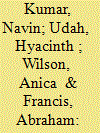

|
|
|
|
|
| Summary/Abstract |
This article explores the lived experiences of some Indian migrant workers (MW) during the first COVID-19 pandemic nationwide lockdown, investigating their plights from a social identity perspective. It analyses crises associated with the COVID-19 pandemic, and with hunger and starvation. Drawing on a qualitative study conducted with twelve participants in the city of Pune in the Western Indian state of Maharashtra, the findings suggest that the participants’ plights have been exacerbated by the COVID-19 pandemic. The findings indicate the need for policy responses to focus on addressing conditions of work, terms of employment and access to necessities for Indian MW, including ensuring conditions for a prompt job-ready recovery and mental health care after the COVID-19 pandemic.
|
|
|
|
|
|
|
|
|
|
|
|
|
|
|
|
| 5 |
ID:
193014
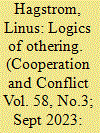

|
|
|
|
|
| Summary/Abstract |
‘Othering’ – the view or treatment of another person or group as intrinsically different from and alien to oneself – is a central concept in the International Relations literature on identity construction. It is often portrayed as a fairly singular and predominantly negative form of self/Other differentiation. During the first months of the COVID-19 pandemic, Sweden at first glance emerged as exactly such a negative Other. This article problematises such a view of Othering. Departing from a narrative analysis of news reporting on Sweden’s management of COVID-19 in the United States, Germany and the Nordic states, the article proposes an ideal type model with four forms of Othering – emotional, strategic, analytic and nuanced – not recognised in previous research. These types differ in their treatment of the Other as more or less significant and in involving a more or less self-reflexive construction of the self. Although narratives in all these settings drew on previously established narratives on Sweden, they followed different logics. This has implications for our understanding of Sweden as an Other in the time of COVID-19, as well as of self/Other relations in International Relations more broadly.
|
|
|
|
|
|
|
|
|
|
|
|
|
|
|
|
| 6 |
ID:
106037
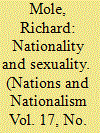

|
|
|
|
|
| Publication |
2011.
|
| Summary/Abstract |
This article seeks to understand why attitudes towards homosexuality in Latvia appear to be more intolerant than in all other EU member states. It argues that, while the impact of religion, the legacy of communism and post-communist transition have all played a role in shaping attitudes towards homosexuality in Central and Eastern Europe, these factors do not explain sufficiently the divergence among post-communist states and, in particular, do not account for Latvia's extreme position. While acknowledging that intolerance towards non-heteronormative sexuality cannot be explained by a single factor but is the cumulative effect of a range of social influences, this study argues that homosexuality is particularly reviled in Latvia because it has been constructed discursively as a threat to the continued existence of the nation in its desired ethnic form and to the core values defining Latvian national identity.
|
|
|
|
|
|
|
|
|
|
|
|
|
|
|
|
| 7 |
ID:
159768
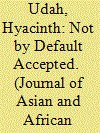

|
|
|
|
|
| Summary/Abstract |
In the face of the increasing migration of black Africans to Australia, this paper seeks to raise conversations about the meta-discourses of Otherness in the Australian society. The paper aims to provide insights into black Africans’ experience of othering and being othered in Australia. The paper draws from a broader study which examined the lived experiences of Africans in South East Queensland and highlights that the presentation of white as norm in Australia, one of or the institutional and social contexts that create conditions reinforcing othering practices, is perpetuated, especially, when the racial order in society is not acknowledged and challenged. The paper proposes that the condition of Africans in Australia may not just be explained by their immigration status or their lack of skills but linked to how they are positioned and constructed in Australia as visible ‘Others.’
|
|
|
|
|
|
|
|
|
|
|
|
|
|
|
|
| 8 |
ID:
184342
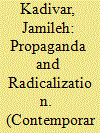

|
|
|
|
|
| Summary/Abstract |
The process of becoming radicalized and joining extremist groups like Daesh, in countries with a Shi’a majority, such as Iran, is a controversial topic that has not received sufficient attention in the literature. This study examines Daesh’s media content in Farsi and seeks to provide an analysis of Daesh’s main messages, which have the primary objective of profoundly impacting their target audiences in Iran. This study collected data from 16 Iranian members of Daesh to discover how they were radicalized and why they decided to join Daesh. This study seeks to understand whether the media and Daesh’s propaganda are indeed the key reasons behind the radicalization of Daesh’s Iranian members and the creation of others’ perception of their mindsets against Iran and its Shi’a population, and to discover other possible factors that play a role in the radicalization process. While Daesh media and messages hold salience in relation to the Daeshization of some, studying such complex socio-political issues is rooted in an amalgamation of different personal, social, political, economic, and cultural push and pull factors. Such phenomena cannot, therefore, be reduced to only one of the mentioned elements.
|
|
|
|
|
|
|
|
|
|
|
|
|
|
|
|
| 9 |
ID:
158922


|
|
|
|
|
| Summary/Abstract |
India is frequently cast as a troublemaker and blamed for the breakdown of the Doha Round. This article provides a critical re-reading of India’s trade policy and its position in multilateral trade negotiations. It challenges the widespread characterisation of India as a recalcitrant spoiler, intent on derailing trade liberalisation at the WTO. It shows that with the emergence of its highly-competitive, export-oriented services sector, India became one of the leading advocates of global services trade liberalisation in the Doha Round. Yet, not unlike the traditional powers, India’s offensive trade interests are also combined with significant defensive concerns in agriculture.
|
|
|
|
|
|
|
|
|
|
|
|
|
|
|
|
| 10 |
ID:
185967
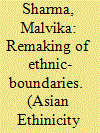

|
|
|
|
|
| Summary/Abstract |
Being an Ethnic-Pahari-Sikh-Borderlander in Poonch, Jammu and Kashmir is a phenomenon that adds to the discourse of ethnicity and nationalism. Partition of the Indian sub-continent in 1947 acted as a disruption in the socio-political history of the ethnic-community of Poonch generating difference and othering. This led to a newer set of challenges that re-imagines the concept of ethnicity altogether. Through an ethnographic account of the religiously assertive Sikh-identity in Poonch, this study asks the questions: Can the religious-reassertion of identities in a community render a concept as giant as ethnicity a myth? What happens to the historic origins of ethnic-bonds when identities begin to organise themselves exclusively on religious lines? Identities in Poonch exist at crossroads where being a religious Sikh challenge the idea of an ethno-geographic Sikh, both of them trying to co-exist under a bigger identity of being a borderlander.
|
|
|
|
|
|
|
|
|
|
|
|
|
|
|
|
| 11 |
ID:
092247
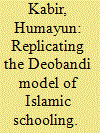

|
|
|
|
|
| Publication |
2009.
|
| Summary/Abstract |
The proliferation of the Deobandi model of religious school has been taken for granted in South Asia, although how its pedagogic method and theological stances are being replicated in Bangladesh has received little academic attention. This paper delves into the replication of the Deobandi model of religious schooling in Bangladesh by describing the replication process in a local Quomi madrasa, which received strong patronage from Deoband at the height of the Islamic revivalist-reformist movements in South Asia. This study reveals that localized versions of Deobandi madrasas in Bangladesh are concerned with the 'other' Muslims, that is, Muslims with doctrinal views differing from the Deobandi school of thought. The contestation between the Deobandi interpretation of Islam and the other interpretive Islamic groups within the circle of madrasas suggests that Muslim identity is a matter of contention, with differing points of view from one type of madrasa to another and from one group of ulama to another.
|
|
|
|
|
|
|
|
|
|
|
|
|
|
|
|
| 12 |
ID:
167642
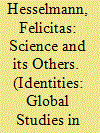

|
|
|
|
|
| Summary/Abstract |
This article investigates the current discourse about scientific misconduct from a postcolonial perspective. It traces the development of a causal story about scientific misconduct, blaming misconduct on so-called foreign scientific cultures said to be most prevalent among developing countries. The paper attempts to show how the discourse on misconduct is structured by themes and logics of coloniality as well as diverges from them, exhibiting shifting categorisations and images of the Other, which oscillate between the Other as a backwards savage and the Other as an advanced machine. Such contradictory categorisations will be argued to be both interpretable as movements to abandon prevailing ideologies of efficiency and progress within science and to make science more inclusive as well as means to uphold and re-establish existing patterns of coloniality in the face of historical changes both within and outside of academic research.
|
|
|
|
|
|
|
|
|
|
|
|
|
|
|
|
| 13 |
ID:
139017
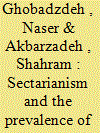

|
|
|
|
|
| Summary/Abstract |
The current sectarian conflicts in the Middle East did not arise solely from renewed geopolitical rivalries between regional powers. They are also rooted in a solid, theological articulation proposed by classic Islamic political theology. The exclusivist approach, which is a decisive part of the political, social and religious reality of today’s Middle East, benefits from a formidable theological legacy. Coining the notion of ‘othering theology’, this paper not only explores the ideas of leading classical theologians who have articulated a puritanical understanding of faith, but also explicates the politico-historical context in which these theologians rationalised their quarrels. Given the pervasive presence of these theologies in the contemporary sectarian polemics, the study of classical othering theology is highly relevant and, indeed, crucial to any attempt to overcome sectarianism in the region.
|
|
|
|
|
|
|
|
|
|
|
|
|
|
|
|
| 14 |
ID:
187077
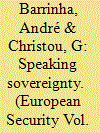

|
|
|
|
|
| Summary/Abstract |
The EU’s revised Cybersecurity Strategy (2020) has been constructed in the context of increasing geopolitical tension and within a dynamically evolving technological environment. The onset of new technologies has brought with it new opportunities but also perceived risks and threats in cyberspace, to which the EU has sought to elicit a more comprehensive approach underpinned by a move to become more “technologically sovereign”. We seek in this article to critically unpack what such claims to technological sovereignty mean for the EU in the cyber domain and what the practical implications are of the EU taking ownership of and performing sovereignty. More specifically, in seeking to conceptually unpack technological sovereignty in its internal and external manifestations, we show how its articulation, legitimisation and operationalisation has implications and consequences for the EU’s identity and action in the cyber domain.
|
|
|
|
|
|
|
|
|
|
|
|
|
|
|
|
| 15 |
ID:
185149
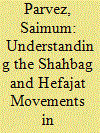

|
|
|
|
|
| Summary/Abstract |
This study examines the role of the press in shaping national identities in contemporary Bangladesh. It employs the critical discourse analysis method to analyze newspapers’ content and closely examines the news texts of three high-profile events in 2013: the Shahbag movement, the murder of blogger Rajib, and the Hefajat movement. Based on the critical discourse analysis of newspaper articles related to these three events, this study observes a discursive construction of two binary and intolerant identities in the coverage. This analysis demonstrates how the discourse of each newspaper creates meanings related to national identities and ideologies that serve to justify the interests of ‘us’ and to criticize ‘them’.
|
|
|
|
|
|
|
|
|
|
|
|
|
|
|
|
|
|
|
|
|